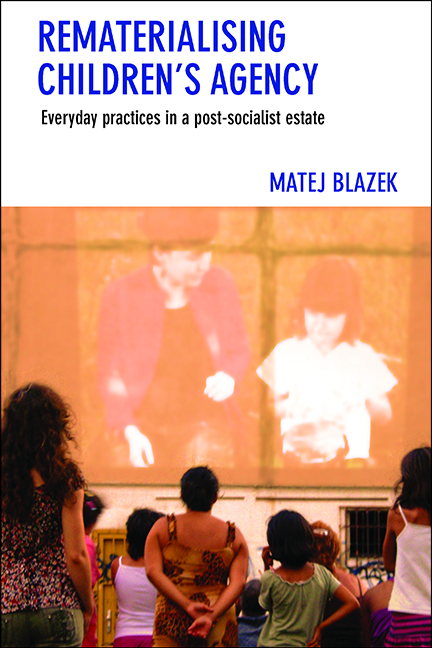eight - Everyday social encounters and circumscribed routines
Published online by Cambridge University Press: 01 September 2022
Summary
I began Chapter Five by describing the first minutes of my first street work shift in Kopčany. I discussed this with a focus on spatial configurations of children’s practices while the role that other people had in children’s experience there was only implicit. And while various people appeared in Chapters Six and Seven, I have not really attended to the consequences of children’s social ties for their practices. This chapter builds a link between discussions of spaces, things and bodies, and children’s social lives. Simply put, I am interested here in how children’s practices are related to their encounters with other people in Kopčany and in commencing the discussion about the role of other people in how children organise their activities in time and space. On a more conceptual basis, I explore these encounters and practices as relational performances of children’s relationships to other people in particular spaces and times. While more grounded social relations of children are analysed in Chapters Nine, Ten and Eleven, it is the moment of their performative expression in children’s activities which is discussed here as a source of understanding how the relational effects of other people on children’s practices emerge. My rationale is linked to Law’s argument that ‘entities achieve their forms as a consequence of the relations in which they are located. But this means … that they are [also] performed in, by, and through those relations’ (Law, 1999, p.4).
Everyday encounters are here considered as specific performances of children’s relations in and through which children come to act on a daily basis. Although the starting point of the analysis is hence located within the ‘surfaces’ of children’s daily lives and not in their ‘depths’ (Laurier and Philo, 2004), following the ‘particular moments or events in what [children] do and think’ (Crouch, 2003, p.1945) – and many argue that these are precisely the moments where and when human subjectivities unfold (Dewsbury, 2000; Latham, 2003) – I am interested in identifying the ways and types of connections in which immediate encounters relate to children’s broader circumstances, including larger social, cultural, economic or political formations.
- Type
- Chapter
- Information
- Rematerialising Children's AgencyEveryday Practices in a Post-Socialist Estate, pp. 139 - 158Publisher: Bristol University PressPrint publication year: 2015



